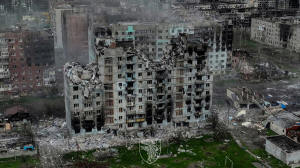Blood, treasure and chaos: the cost of Russia's war in Ukraine
 Send a link to a friend
Send a link to a friend
 [June 05, 2023]
By Guy Faulconbridge [June 05, 2023]
By Guy Faulconbridge
MOSCOW (Reuters) - Russia's 2022 invasion of Ukraine has left tens of
thousands of dead, displaced millions and sown economic turmoil across
the world.
Here are some details of the impact:
* DEATH
The war has caused death on a level not seen in Europe since World War
Two.
From Feb. 24, 2022 to May 21, 2023, 8,895 civilians have been recorded
as killed and 15,117 injured, according to the United Nations High
Commissioner for Human Rights (OHCHR), which said it believed the actual
figures were considerably higher.
As many as 354,000 Russian and Ukrainian soldiers have been killed or
injured, according to a trove of purported U.S. intelligence documents
posted online.
Ukraine has not said how many of its soldiers have been killed. Russian
Defence Minister Sergei Shoigu said on Sept. 21 that 5,937 Russian
soldiers had been killed since the start of the war. No further updates
have been given.
Both Ukraine and Russia say the other side has sustained devastatingly
high casualties. Reuters was unable to verify battlefield claims from
either side.
Western diplomats told Reuters that Russia's deaths and casualties
totalled around 200,000.

Russia's Shoigu said that 16,000 Ukrainian soldiers had been lost in May
alone. Russia's most powerful mercenary, Yevgeny Prigozhin, said that
72,000 Ukrainian soldiers had been killed in the 8-month "meat grinder"
of Bakhmut.
Wagner, he said, had recruited around 50,000 convicts during the war, of
whom about 20% had perished. Around the same amount of his contract
soldiers - 10,000 - had perished, he said. Kyiv says Russia's casualties
in Bakhmut are far bigger than its own.
The conflict in eastern Ukraine began in 2014 after a pro-Russian
president was toppled in Ukraine's Maidan Revolution and Russia annexed
Crimea, with Russian-backed separatist forces fighting Ukraine's armed
forces.
About 14,000 people were killed there between 2014 and the end of 2021,
according to OHCHR, including 3,106 civilians.
* MISERY
Since the 2022 invasion, millions of Ukrainians have been forced from
their homes, the United Nations refugee agency has said. Ukraine has a
population of more than 41 million.
An estimated 17.6 million people in Ukraine require urgent humanitarian
support, including more than 5 million people internally displaced by
the war, the UNHCR said.
There are over 8 million refugees from Ukraine recorded across Europe,
with the biggest numbers in Russia, Poland, and Germany, according to
the agency's data. Russia has 2.9 million registered Ukrainian refugees.
* UKRAINE
Ukraine has lost control of at least 17-18% of its land to Russia,
including a swathe of coastline. Its economy has been crippled and some
cities have been turned into wastelands by the fighting.

Ukraine's economy contracted by 30% in 2022 and is projected to contract
by another 3% in 2023, according to the International Monetary Fund.
Ukraine's reconstruction and recovery will cost $411 billion over the
next decade, according to a joint assessment by Ukraine, the World Bank
Group, the European Commission, and the United Nations.
It is unclear how much Ukraine has spent on the fighting.
[to top of second column]
|

An aerial view shows destructions in the
frontline town of Bakhmut, amid Russia's attack on Ukraine, in
Donetsk region, Ukraine, in this handout picture released on May 21,
2023. Press Service of the 93rd Kholodnyi Yar Separate Machanized
Brigade of the Ukrainian Armed Forces/Handout via REUTERS

* RUSSIA
Russia's expenditure on the war is a state secret, but it coincides
with a major shock to the Russian economy from the toughest ever
Western sanctions imposed after the invasion.
The economy defied early expectations for a double-digit contraction
in 2022, but a return to prosperity remains a long way off as the
government directs more spending towards the military.
Russia's economy ministry expects GDP growth of at least 1.2% this
year. The International Monetary Fund (IMF) forecasts 2023 growth of
0.7% and expects global isolation and lower energy revenues to
dampen Russia's prospects for years to come.
As Russia's military spending soars and sanctions squeeze its energy
revenues, Moscow faces a battle to keep its budget deficit in check.
Russia has lost a major chunk of the European gas market but has
been able to keep selling its oil to global markets.
It has been excluded from Western financial markets, most of its
oligarchs are sanctioned, and it is experiencing problems sourcing
some items such as microchips.
CIA Director William Burns said earlier this year that Putin risked
turning Russia into "an economic colony of China over time".
Russia has defaulted on its foreign bonds for the first time since
the calamitous months following the 1917 Bolshevik revolution.
* PRICES
The invasion and Western sanctions on Russia led to steep rises in
the prices of fertiliser, wheat, metals and energy, fuelling an
inflationary wave and a global food crisis.
Russia is the world's second largest oil exporter after Saudi Arabia
and the world's biggest exporter of natural gas, wheat, nitrogen
fertiliser and palladium.

Shortly after Russia's invasion of Ukraine, international oil prices
spiked to their highest levels since the records of 2008.
The IMF said in April that the dislocations to the energy and food
markets caused by the war were receeding.
"Commodity prices that rose sharply following Russia’s invasion of
Ukraine have moderated, but the war continues, and geopolitical
tensions are high," the IMF said.
* WESTERN WEAPONS
Since the invasion, the United States has committed more than $37.6
billion in security assistance to Ukraine, including stinger
anti-aircraft systems, Javelin anti-armour systems, 155mm Howitzers
and equipment to protect against chemical, biological, radiological
and nuclear attack.
The biggest overall supporters of Ukraine in nominal terms are the
United States, the European Union, Britain, Germany and Japan,
according to The Kiel Institute for the World Economy.
Russia says the West's weapons supplies are escalating the war.
Brazilian President Luiz Inacio Lula da Silva has said that the West
has been encouraging the war by arming Ukraine. China has refused to
condemn Russia and says it is seeking peace.
(Reporting by Guy Faulconbridge; editing by Philippa Fletcher)
[© 2023 Thomson Reuters. All rights
reserved.]This material may not be published,
broadcast, rewritten or redistributed.
Thompson Reuters is solely responsible for this content. |